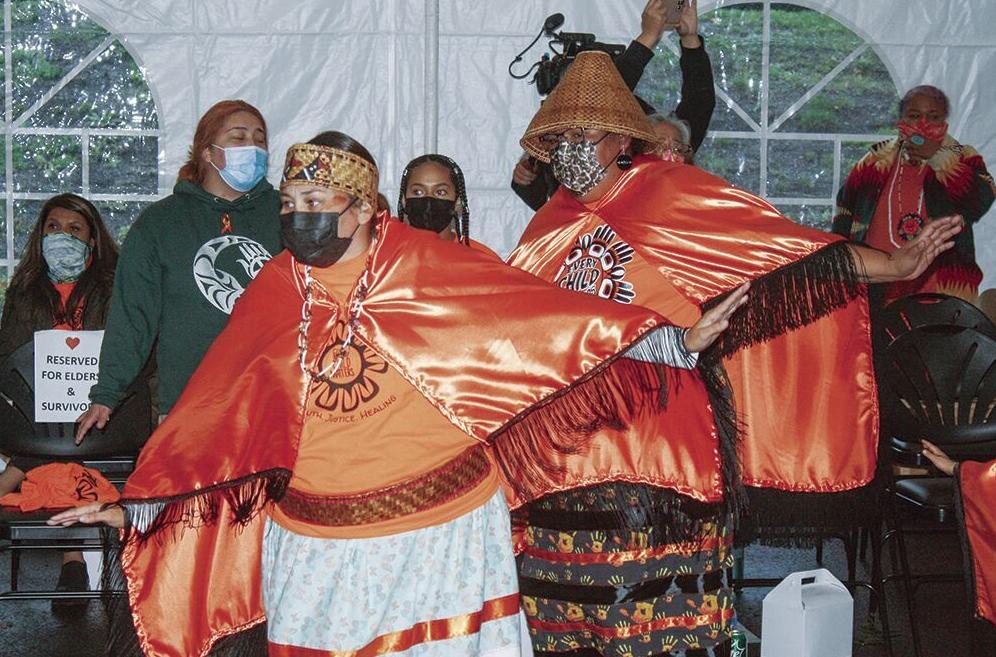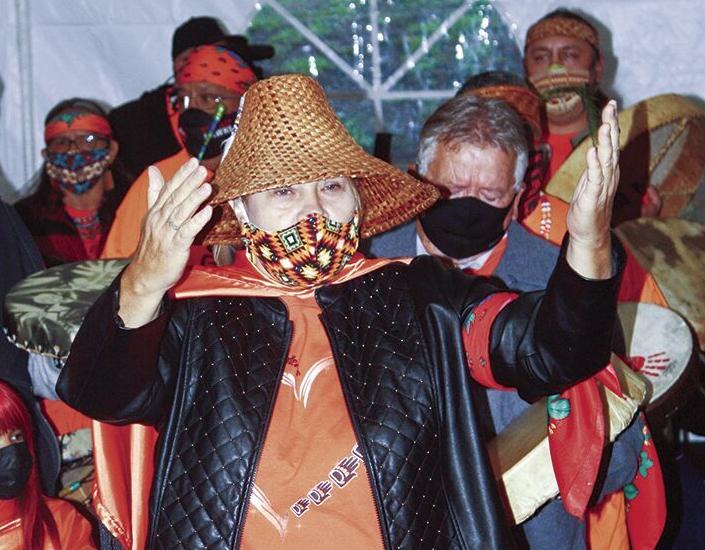The day is meant to bring awareness to the abuses of the Native boarding school system
Tulalip Tribal members and other local Native people gathered to remember injustices by the Native boarding school system on Sept. 30.
The day is known as "National Day for Truth and Reconciliation" in Canada.
It is also known as ‘Orange Shirt Day’ after residential school survivor Phyllis Jack Webstad, who said her new orange shirt from her grandmother was taken away during her first day and was never returned.
One of the boarding schools in the U.S. used to be located on the Tulalip Reservation.
On Sept. 30, more than a hundred community members gathered near that location to remember, commemorate those who were lost, and to perform traditional songs and dances.
“It was [U.S. General Richard] Pratt who said ‘kill the Indian, save the man,’ and then he created the Indian boarding schools with a lot of the churches and government officials,” said Tulalip Tribal board member Misty Napeahi. “If you look around at each other, his plan didn’t work. Do we have a lot of social issues from those policies? We do, but we’re still strong enough to overcome them and I know we can."
The boarding schools in the U.S. removed children from their parents during the 19th century to the mid-20th century.
“This is a part of our history that has been buried and not a lot of people know about,” said Tulalip Tribal chairwoman Teri Gobin. “They don’t know how many children suffered or were taken away as young kids."
Parents who spoke at the event said it is hard to imagine a government agency coming for their children.
“I can’t imagine someone coming to my house and taking my baby. It kills me to think they actually lived through that,” said Napeahi.
Native boarding schools were often an intentional attempt to inculcate children into European culture, said Tulalip officials.
“They lost their language, they lost their culture and tried to assimilate us,” said Teri Gobin.
Tulalip officials said oftentimes it was their parents or their grandparents who experienced the boarding schools first hand.
“My dad was locked in the closet for being a bad kid when he received the news that his brother died,” said Teri Gobin.
Don Hatch Jr., a Tulalip tribal member, said his mother went to the Tulalip boarding school.
“She lived a half a mile from here and she could see her home but she couldn’t go home. She had to stay here at school,” said Hatch.
The effect of losing generations to the boarding schools is still being felt in Native communities.
“There are families that haven’t been able to move beyond that and families still stuck in that,” said Tulalip Tribal vice-chairmen Glen Gobin.
Many children returned with trauma that they had to deal with for the rest of their lives.
“They showed us they loved us, but it was hard for them to hug and tell us,” said Teri Gobin.
Glen Gobin said he was glad the community showed up to honor and respect the date.
“I didn’t think in my lifetime that I would have a gathering like this, where we come together as a tribe with this many people, especially this many young people, to talk about the boarding schools,” he said.
Earlier this summer the history of residential schools re-emerged because of 751 unmarked graves found near a Canadian Native boarding school.
Tulalip Tribal officials and other Native groups are pushing for legislation for a full investigation into the boarding schools of the U.S.
“We haven’t got the apologies from the government like they did in Canada, or from the churches,” said Teri Gobin.
“There’s never been a full acknowledgment of the atrocities that came across our people in these boarding schools,” said Glen Gobin.



(0) comments
Welcome to the discussion.
Log In
Keep it Clean. Please avoid obscene, vulgar, lewd, racist or sexually-oriented language.
PLEASE TURN OFF YOUR CAPS LOCK.
Don't Threaten. Threats of harming another person will not be tolerated.
Be Truthful. Don't knowingly lie about anyone or anything.
Be Nice. No racism, sexism or any sort of -ism that is degrading to another person.
Be Proactive. Use the 'Report' link on each comment to let us know of abusive posts.
Share with Us. We'd love to hear eyewitness accounts, the history behind an article.